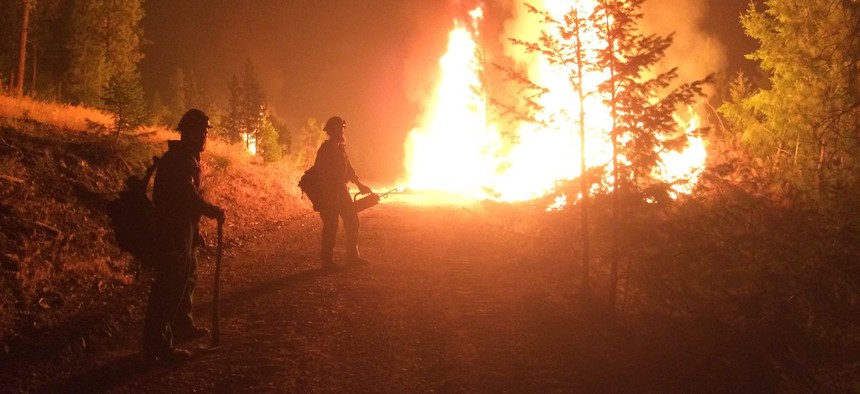
Two firefighters watch the flames during the Sunrise Fire in Western Montana in August 2017. The reintroduced firefighter bill is named for a smokejumper who died in 2021 fighting a wildfire in New Mexico. Bureau of Land Management
Congressional Dems Reintroduce Bill to Revamp Federal Firefighter Pay and Benefits
The Tim Hart Wildland Firefighter Classification and Pay Parity Act would ensure federal wildland firefighters make at least $20 per hour, among other things.
Democrats in the House and Senate on Tuesday reintroduced legislation aimed at revamping pay and benefits for federal wildland firefighters, which, if enacted, would boost pay permanently and provide a new form of overtime pay.
The Tim Hart Wildland Firefighter Classification and Pay Parity Act (H.R. 3108), introduced by Rep. Joe Neguse and Sen. Michael Bennet, both D-Colo., would establish new special pay rates for federal wildland firefighters to make they all make at least $20 per hour and would establish a new form of overtime pay—incident standby premium pay—to compensate firefighters for all hours they are mobilized to respond to a fire incident.
The bill also would provide paid rest and recuperation leave following a deployment to combat wildfires, seven days of mental health leave per year, as well as create a database to track chronic diseases caused by on-the-job exposure to environmental toxins. And it would allow federal firefighters to credit years of service under temporary appointments to toward their retirement benefits, as well as include premium pay in calculation of their defined benefit annuity.
Previous versions of the bill, named for a smokejumper who died in 2021 fighting a wildfire in New Mexico, failed to pass both chambers of Congress, although elements of the legislation did make their way into law over the past two years. In 2021, the bipartisan infrastructure law created a new bespoke job classification series for wildland firefighters, temporary pay raises and new mental health services for federal firefighters.
And last year, the fiscal 2023 National Defense Authorization Act included language establishing the presumption that federal firefighters who develop any one of a number of serious health conditions, including lung diseases, did so due to on-the-job exposure to smoke and other hazardous materials for the purposes of securing workers compensation benefits through the Federal Employees’ Compensation Act.
In a statement, Neguse praised the Biden administration’s efforts to improve the pay and benefits of federal firefighters, but said the federal government needs a permanent solution to its long-running firefighter staffing shortage.
“We no longer have wildfire seasons—we have wildfire years, and our federal wildland firefighting crews bear the heavy burden every day of keeping us safe,” he said. “Our federal firefighters sacrifice so much, and they deserve fair pay, benefits and the resources necessary to do their jobs. We must ensure they are paid a wage that reflects the value of their work.”
“As climate change fuels increasingly severe fires in Colorado, we rely on wildland firefighters more and more to prevent megafires and protect homes and communities,” Bennet said. “These firefighters deserve fair pay, support for their mental and physical health, and time to recover from their dangerous work.”
Randy Erwin, president of the National Federation of Federal Employees, which represents around 10,000 federal wildland firefighters, applauded lawmakers’ continued focus on making federal firefighting jobs competitive with their state and local governmental counterparts.
“Although we made significant progress during the previous Congress on federal wildland firefighter issues, there is still so much work to be done,” he said. “This Congress must pass Tim’s Act to support wildland firefighters with critical reforms before we lose more firefighters to state and local fire departments. The women and men who risk their lives protecting our communities from the growing wildfire crisis are being failed by the federal government. We must provide these brave public servants with permanent fixes to pay, housing, health care, and mental health services.”







